 Ahmad Ahmad, President, Confederation of Africa Football (CAF)
Ahmad Ahmad, President, Confederation of Africa Football (CAF)
Africa’s leading football official, Ahmad Ahmad from Madagascar, has been refused a visa to travel to the US to attend the crucial FIFA Council meetings in Miami at the end of this week, according to African sources.
Ahmad, president of the Confederation of Africa Football (CAF), is a key ally of FIFA president Gianni Infantino and would have been one of the important voices of support for Infantino’s global calendar plans.
The reasons for the denial of Ahmad’s visa by US authorities are unknown. There are no US government-issued travel bans to the US on Malagasy citizens. Madagascar is not part of the US’s ESTA Visa waiver programme.
The denial of a US visa is particularly unusual for such a high ranking official attending an important meeting in the country. It is not clear whether he will be able to appeal the decision in time to attend or whether higher US government forces will intervene on his behalf – much would obviously depend on the reasons for the visa denial
The US is taking the lead in hosting the World Cup in 2026 and while it questions their travel policy, it does also spotlight the CAF president who has come under increasing criticism by his own supporters within Africa for an increasingly autocratic decision-making style at the confederation.
That style has led to an open letter from CAF executive committee member Musa Bility, former president of the Liberian FA, questioning Ahmad’s authority to make what have apparently been unilateral decisions on the hosting of the Africa Cup of Nations as well as on the ethics surrounding a deal for a new betting sponsor.
Another executive committee member, Isha Johansen from Sierra Leone, has similarly called for more African unity and transparency in CAF’s decision making. Both Bility and Johansen were vocal supporters of Ahmad in his 2017 election campaign that saw him unseat long time CAF president Issa Hayatou.
That lead to a sweeping change of CAF management with Ahmad relying heavily on his allies in Morocco. His Moroccan alliances now look to be alienating the rest of his support in Africa.
CAF’s secretary general Amry Fahmy returned recently from illness to find Ahmad had effectively sidelined him with the appointed of a ‘General Co-ordinator’ from Morocco who had become the main liaison between CAF’s executive committee (exco) and its full time executive, often taking decisions that had not been agreed by the exco.
Fahmy, an Egyptian, was part of a family dynasty at CAF following in the footsteps of his father Mustapha, who held the post until 2010 before being appointed as the director of competitions at FIFA. Mustapha had taken over the position from his father Mourad.
With the waning Egyptian influence in CAF has come the very rapid increase of influence from Morocco. An influence that has caused pan-regional concern with CAF recently holding all its key meetings in the country rather than at its headquarters in Cairo. Moroccans hold key positions leading and managing the finance committee while there at least 12 Moroccans reportedly sitting on CAF committees.
It is understood that Ahmad’s concentration of power and decision making has even raised concerns within the Egyptian FA, traditionally a leading power in the African region and no friend of the previous Hayatou regime in its dieing days. Egyptian president Hany Abo Rida, a hugely significant supporter and facilitator at Ahmad’s election, is understood to have reservations over the direction CAF has taken.
Ahmad to a large degree has relied on his influence at, and the protection of, FIFA, to bolster his decision-making confidence. But it looks like he will not be in Miami to give support to, or rally support from, his friends. And it looks like those within his previous support base may no longer be comfortable with his governing style, and indeed the governance surrounding it.